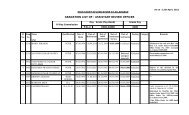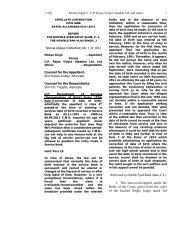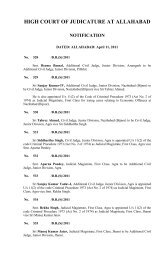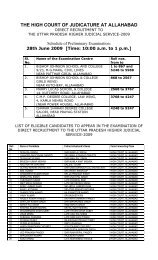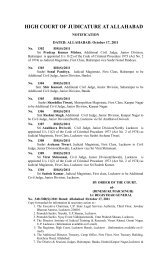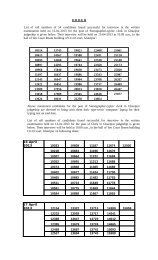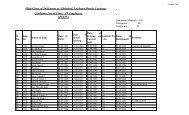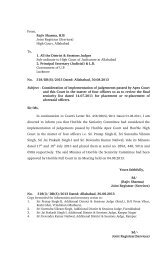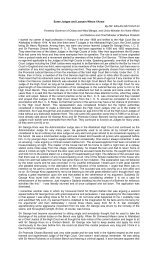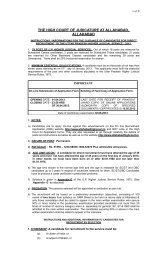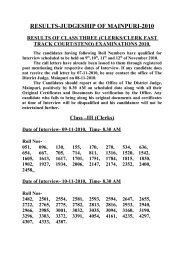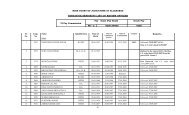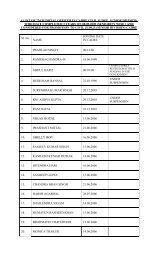Apr - High Court of Judicature at Allahabad
Apr - High Court of Judicature at Allahabad
Apr - High Court of Judicature at Allahabad
You also want an ePaper? Increase the reach of your titles
YUMPU automatically turns print PDFs into web optimized ePapers that Google loves.
1 All] Kulwant Singh V. St<strong>at</strong>e <strong>of</strong> U.P. and others 423<br />
<strong>Court</strong> in the case <strong>of</strong> Harbhajan Singh<br />
and another versus St<strong>at</strong>e <strong>of</strong> Punjab and<br />
another, reported in (2009) 13 SCC<br />
608, but it has been observed th<strong>at</strong> "if a<br />
judicious discretion exercised by the<br />
<strong>Court</strong> had led it to pass an order under<br />
Section 319 <strong>of</strong> the Code, the <strong>High</strong> <strong>Court</strong><br />
exercising a revisional jurisdiction would<br />
interfere therewith, inter alia, in a case<br />
where legal principles laid down by this<br />
court had not been s<strong>at</strong>isfied.<br />
6. In the case <strong>of</strong> Sarabjit Singh and<br />
another versus St<strong>at</strong>e <strong>of</strong> Punjab and<br />
another, reported in (2009) 16 SCC 46,<br />
the Division Bench <strong>of</strong> two Hon'ble Judges<br />
<strong>of</strong> the Supreme court has also taken note<br />
<strong>of</strong> the aforesaid reference and observed as<br />
under:-<br />
"21.An order under Section 319 <strong>of</strong><br />
the Code, therefore, should not be passed<br />
only because the first informant or one <strong>of</strong><br />
the witnesses seeks to implic<strong>at</strong>e other<br />
person(s). Sufficient and cogent reasons<br />
are required to be assigned by the court so<br />
as to s<strong>at</strong>isfy the ingredients <strong>of</strong> the<br />
provisions. Mere ipse dixit would not<br />
serve the purpose. Such an evidence must<br />
be convincing one <strong>at</strong> least for the purpose<br />
<strong>of</strong> exercise <strong>of</strong> the extraordinary<br />
jurisdiction. For the aforementioned<br />
purpose, the courts are required to apply<br />
stringent tests; one <strong>of</strong> the tests being<br />
whether evidence on record is such which<br />
would reasonably lead to conviction <strong>of</strong><br />
the person sought to be summoned."<br />
7. The Supreme <strong>Court</strong> further held<br />
th<strong>at</strong> the higher standard be set up for the<br />
purpose <strong>of</strong> invoking the jurisdiction under<br />
section 319 <strong>of</strong> the Code.<br />
8. In the case <strong>of</strong> Y.Saraba Reddy<br />
versus Puthur Rami Reddy and<br />
another, reported in (2007) 4 SCC 773,<br />
the Division Bench <strong>of</strong> three Judges <strong>of</strong> the<br />
Hon'ble Supreme <strong>Court</strong> considered the<br />
scope <strong>of</strong> Section 319 <strong>of</strong> the code <strong>of</strong><br />
Criminal Procedure and took note <strong>of</strong><br />
earlier decisions i.e. Joginder Singh<br />
versus St<strong>at</strong>e <strong>of</strong> Punjab, reported in<br />
(1979) 1 SCC 345 as well as the<br />
Municipal Corpor<strong>at</strong>ion <strong>of</strong> Delhi versus<br />
Ram Kishan Rohtagi, reported in<br />
(1983) 1 SCC 1. The relevant paragraph<br />
10 and 11 <strong>of</strong> the case <strong>of</strong> Municipal<br />
Corpor<strong>at</strong>ion <strong>of</strong> Delhi (Supra) are<br />
reproduced hereunder:-<br />
"10. On a careful reading <strong>of</strong> Section<br />
319 <strong>of</strong> the Code as well as the aforesaid<br />
two decisions, it becomes clear th<strong>at</strong> the<br />
trial court has undoubted jurisdiction to<br />
add any person not being the accused<br />
before it to face the trial along with the<br />
other accused persons, if the court is<br />
s<strong>at</strong>isfied <strong>at</strong> any stage <strong>of</strong> the proceeding on<br />
the evidence adduced th<strong>at</strong> the persons<br />
who have not been arrayed as accused<br />
should face the trial. It is further evident<br />
th<strong>at</strong> such person, even though had initially<br />
been named in the FIR as an accused, but<br />
not charge-sheeted, can also be added to<br />
face the trial. The trial court can take such<br />
a step to add such persons as accused only<br />
on the basis <strong>of</strong> evidence adduced before it<br />
and not on the basis <strong>of</strong> m<strong>at</strong>erials available<br />
in the charge-sheet or the case diary,<br />
because such m<strong>at</strong>erials contained in the<br />
charge-sheet or the case diary do not<br />
constitute evidence. Of course, as evident<br />
from the decision in Sohan Lal v. St<strong>at</strong>e<br />
<strong>of</strong> Rajasthan, reported in (1990) 4 SCC<br />
580 the position <strong>of</strong> an accused who has<br />
been discharged stands on a different<br />
footing.<br />
11. Power under Section 319 <strong>of</strong> the<br />
Code can be exercised by the court suo



